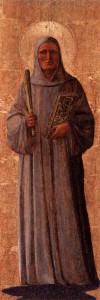Saint Bernard was the brother of Saint Humbeline. At 22, he and four of his blood brothers with 25 friends, entered the new form of monastic life at Citeaux; at some point later, another brother and his father joined him. The monks at the Abbey of Citeaux were reformed Benedictines. In a short time Bernard became the abbot of Clairvaux with a constituency of nearly 700. One of his spiritual sons became Blessed Eugene III, pope.
Bernard (+1153), Cistercian abbot, saint, and Doctor of the Church, is no easy thinker to face alone. You really do need God’s grace to help you get through his works. Challenging is a good word when thinking of Saint Bernard.
History credits Bernard with the foundation of no fewer than 163 monasteries in his lifetime. When Bernard died, historians labeled the Cistercians as the first true Order in the Church with nearly 343 communities. He singularly did more than any other for the Cistercian order than any.
As one Benedictine nun said of Saint Bernard, he was angry a lot of the time, a brilliant writer even when he nothing to say, at odds with Abelard, condemned for preaching the Second Crusade, and kind to Jews at a time when no one was kind to Jews (we know of a German rabbi saying his community received help and protection from the holy abbot).
Bernard’s love of family, affection for others, and capabilities are well-known, but so are his limitations. One of the power-broker churchmen of the time, Cardinal Haimeric, thought that Bernard was meddling in matters above above his competence. The Cardinal cleverly said, “It is not fitting that noisy and troublesome frogs should come out of their marshes to trouble the Holy See and the cardinals.”
And Bernard’s response, “”Forbid those noisy troublesome frogs to come out of their holes, to leave their marshes . . . Then your friend will no longer be exposed to the accusations of pride and presumption.”
One of the theological positions Bernard held was not holding to the doctrine of the Immaculate Conception of Mary. This doesn’t make Bernard a questionable man of the Church because the doctrine of the Immaculate Conception was not defined until the 19th century. And yet, he sang eloquently of the Virgin Mary.
Questions of the parameters of justification John Calvin to quote Bernard in his heretical teaching. Bernard was a solid theologian that led Pope Pius VIII to name him a Doctor of the Church and the “last of the Fathers.”
